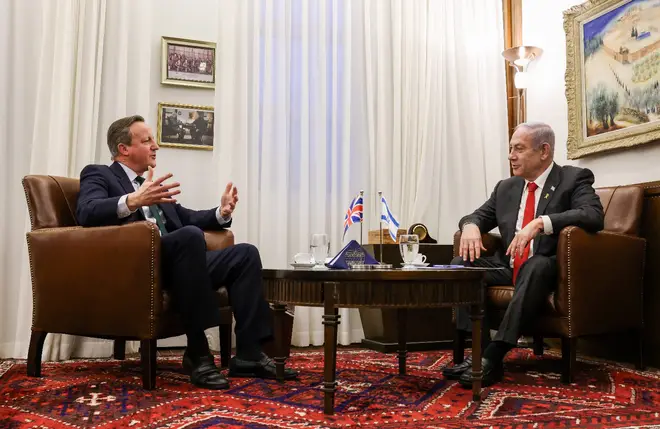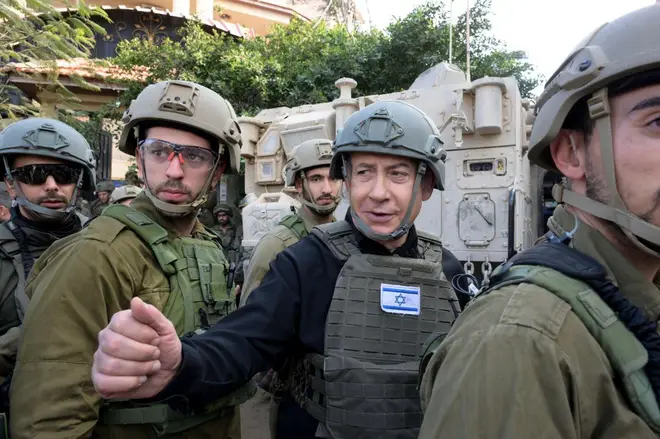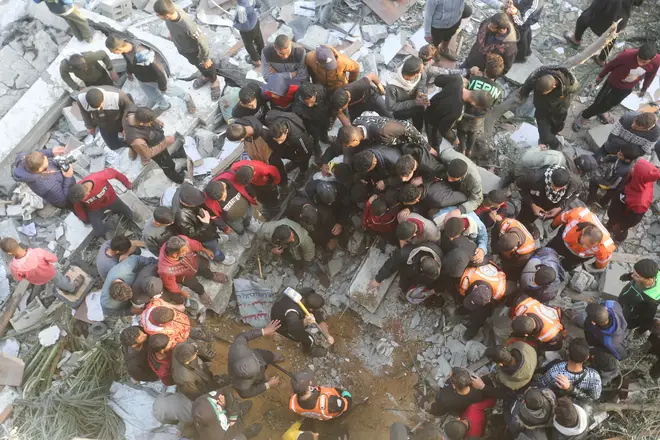
Shelagh Fogarty 1pm - 4pm
25 January 2024, 10:53

David Cameron has called for a ceasefire in Israel's war with Hamas as he pushed Benjamin Netanyahu on the need for a two-state solution.
The Foreign Secretary said that the people in Gaza were enduring "unimaginable" suffering, three and a half months into a war that has seen more than 25,000 die.
Speaking after a meeting with Benjamin Netanyahu Jerusalem, Lord Cameron called for "an immediate humanitarian pause" to allow more aid to come in and more hostages to get out.
He said that Israel should open more crossing points into Gaza to allow aid into the territory,
The pause in hostilities must be followed "a sustainable ceasefire" with no more fighting after that, the Foreign Secretary said. Lord Cameron also called for the protection of medics and hospitals during the war.
I met President Abbas to discuss the situation in the West Bank and Gaza.
— David Cameron (@David_Cameron) January 25, 2024
I set out our plan to move from a pause - to get aid in and hostages out - towards a sustainable ceasefire, leading to a long term political solution, including a Palestinian state. pic.twitter.com/2KGkxMzZlU
Israeli Prime Minister Benjamin Netanyahu has said that he opposes the creation of a Palestinian state, which goes against the policies of allies like the US and the UK.
In a statement, Lord Cameron said: "The scale of suffering in Gaza is unimaginable. More must be done, faster, to help people trapped in this desperate situation.
"As I said to PM Netanyahu yesterday, far more trucks need to be able to enter Gaza and more crossings need to open.
"We need an immediate humanitarian pause to get aid in and hostages out, followed by a sustainable ceasefire, without a return to hostilities."

Lord Cameron also met Mahmoud Abbas, the president of the Palestine Authority in Ramallah, in the West Bank during the trip.
The British government said that a 17-tonne consignment of family-sized tents from the UK and Qatar was being flown into Gaza on Thursday.
Mr Netanyahu said last week that his government opposes the creation of a Palestinian state.
He also rejected ceasefire terms with Hamas for releasing hostages, which included the IDF withdrawing from Gaza entirely, and leaving the terrorist group in power.
The Israeli prime minister said on January 18 that his country must have security control over all land west of the river Jordan, including Gaza, to prevent an atrocity like the October 7 massacre taking place again.

He told reporters: "This is a necessary condition, and it conflicts with the idea of (Palestinian) sovereignty.
"What to do? I tell this truth to our American friends, and I also stopped the attempt to impose a reality on us that would harm Israel's security."
Mr Netanyahu also vowed to press on with the war in Gaza "until complete victory", including the total destruction of Hamas and the return of all surviving hostages still held captive.
The current war between Israel and Hamas, the fifth and by far deadliest, began when Palestinian militants broke through Israel's defences and rampaged through several nearby communities, killing some 1,200 people, mostly civilians, taking around 250 people hostage and shattering Israelis' sense of security.

Shelagh Fogarty presses Palestinian ambassador to say if he's 'urging Hamas to free hostages'
Israel's offensive has killed more than 25,000 Palestinians in Gaza and wounded more than 60,000, according to the health ministry in the Hamas-ruled territory. The ministry does not distinguish between civilians and combatants but says around two-thirds of those killed were women and children.
The Israeli military says it has killed around 9,000 militants, without providing evidence, and blames the high civilian death toll on Hamas because it positions fighters, tunnels and other militant infrastructure in dense residential areas.
Some 85% of Gaza's population of 2.3 million have fled their homes, seeking elusive shelter in the south as Israel continues to strike all parts of the besieged enclave